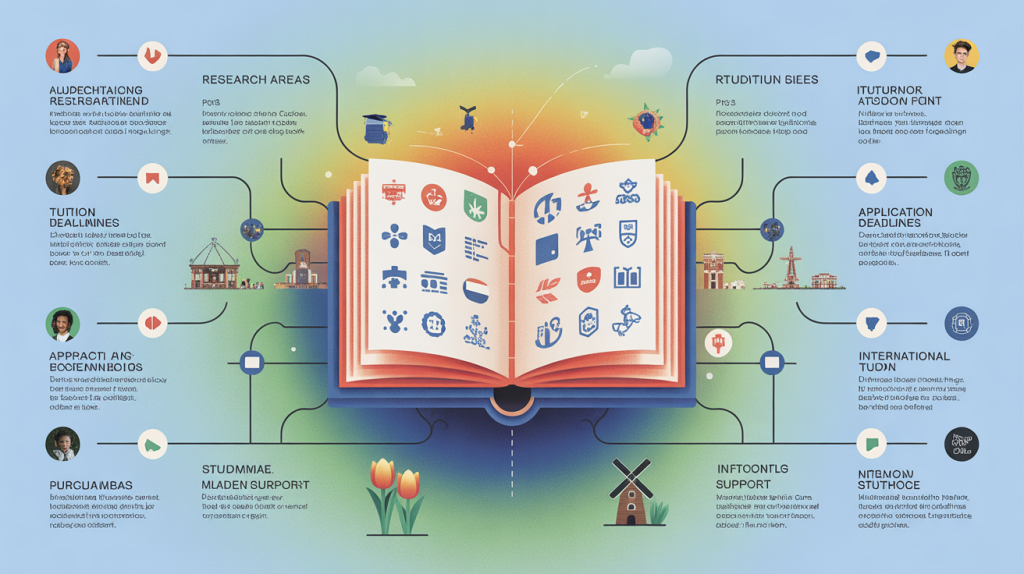How to Research Dutch Universities and Study Programs: A Comprehensive Guide for International Students
Quick Navigation
Exploring English-Taught Programmes in the Netherlands
One of the first and most important steps is to explore the wide array of English-taught study programs available across the Netherlands. With hundreds of bachelor’s, master’s, and short courses offered in English, the country provides accessible education for non-Dutch speakers.
Why Focus on English-Taught Programs?
- Global Accessibility: English-taught programs eliminate language barriers for international students, improving recruitment reach.
- Diverse Fields: From engineering and business to arts and social sciences, Dutch universities offer programs across disciplines.
- Quality Assurance: Many English-taught programs adhere to strict European education standards.
Using Study in Netherlands to Filter Programmes
The Study in Netherlands platform allows recruiters and students to filter programs dynamically by:
- Subject area (e.g., Engineering, Computer Science, Social Sciences)
- Degree level (Bachelor’s, Master’s, Short courses)
- Language of instruction (English-taught options)
- Location and institution type
Comparing Dutch Universities: What to Consider
Selecting a university goes beyond program content—it’s essential to consider institutional reputation, student support, career prospects, and overall international student experience.
Key Factors to Evaluate
- Academic Focus and Reputation: Research universities generally emphasize research and theory, while universities of applied sciences focus on practical skills.
- Student Support Services: Facilities such as language support, counseling, academic advising, and career guidance play a vital role in student satisfaction and success.
- Living and Career Opportunities: Campus location, cost of living, housing availability, and local job markets for internships or part-time work can influence student decisions.
- International Student Satisfaction: Look for data and testimonials reflecting the experiences of former and current international students.
Reviewing Programme Details Thoroughly
A detailed understanding of each study program’s specifics is crucial for making informed recommendations and successful applications.
Important Aspects to Analyze
- Course Curriculum and Structure: Examine core subjects, electives, practical components, thesis requirements, and flexibility.
- Entry Requirements:
- Academic qualifications and prerequisites
- Language proficiency (IELTS, TOEFL scores)
- Additional requirements (motivation letters, portfolios, interviews)
- Tuition Fees and Cost of Living: Gathering accurate financial data prevents surprises later and supports transparent advisory for students.
- Scholarship and Funding Opportunities: Identify available scholarships, grants, and financial aid options to enhance affordability.
Navigating the Application Process with Confidence
Applications to Dutch universities are streamlined and centralized via Studielink, the official portal for Dutch higher education applications. Guiding students through this platform is a critical aspect of recruitment and admission workflows.
Steps through Studielink:
- Creating an Account: Non-residents can register without requiring DigiD (Dutch digital identity).
- Uploading Required Documents: Passports, academic transcripts, language certificates, and other materials.
- Selecting Study Programs: Students may choose up to four programs, of which two can be subject to a selection quota.
Planning for Life in the Netherlands
Studying abroad encompasses more than academics. Holistic preparation is essential for student well-being and integration.
Essential Pre-Arrival Considerations
- Visa and Residence Permits: Specific procedures for non-EU citizens, including documentation and timelines.
- Housing and Insurance: Options range from university dormitories to private accommodation, with insurance requirements clearly outlined.
- Departure and Arrival Checklists: Practical steps to ensure smooth transitions, such as banking, mobile plans, and health preparations.
- Work and Internship Opportunities: Guidelines for balancing work alongside studies, enhancing employability.
Connecting with the International Student Community
Experience sharing and peer support form critical parts of the international education journey.
How to Leverage University Resources:
- Student Testimonials: Real-life stories help prospects envision their future and alleviate concerns.
- Virtual Open Days and Webinars: Interactive sessions provide direct engagement with university representatives and current students.
- Contact Points for Prospective Students: Dedicated staff respond to queries and offer personalized guidance.
Why Partner with Study in Netherlands for Your Recruitment Needs?
At Study in Netherlands, we pride ourselves on being the leading platform and partner in international education recruitment. Our advantages include:
- Comprehensive, Verified Data: Stay updated with the latest university profiles, program details, and procedural guides.
- Expert Support: Benefit from our experienced team’s insights into Dutch higher education systems and international student needs.
- Tailored Services: We customize solutions fitting your operational models.
Conclusion and Call to Action
Effectively researching Dutch universities and study programs is vital for enabling international students to make well-informed decisions. By leveraging the Study in Netherlands platform’s reliable resources, detailed information, and streamlined application guidance, education professionals can enhance their recruitment efforts and improve student outcomes.
Take the Next Step with Study in Netherlands
Are you ready to optimize your international student recruitment process and partner with the Netherlands’ leading education platform? Explore further:

